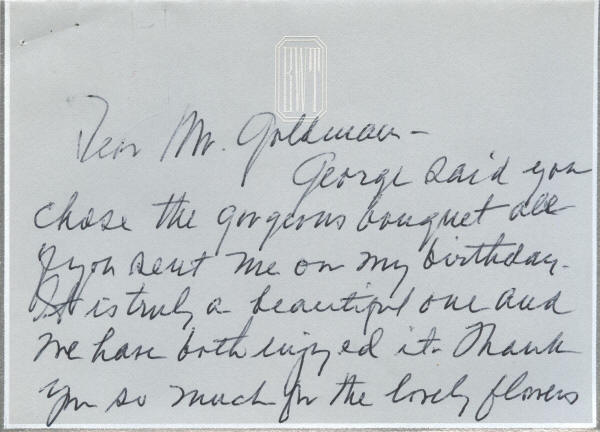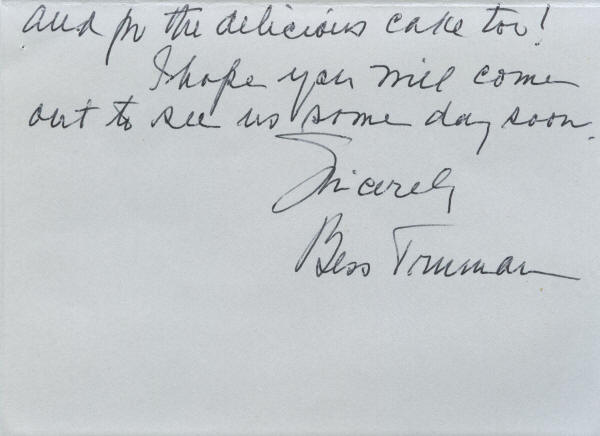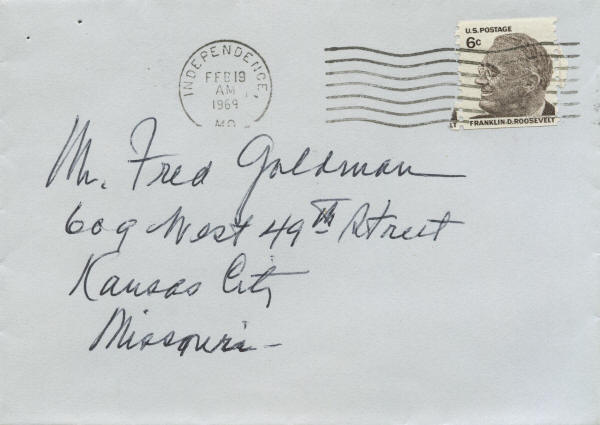


531101
Bess W. Truman
“I hope you will come out to see us some day soon."
Elizabeth Virginia ("Bess") Wallace Truman, 1885–1982. First Lady of the United States, 1945-1953. Autograph Note Signed, Bess Truman, two pages, with integral leaf attached, on personal note stationery, no place [Independence, Missouri], no date [February 19, 1969]. With original autograph mailing envelope.
The wife of former President Harry S. Truman, the longest-living first lady at age 97 at the time of her death on October 18, 1982, writes here to express her appreciation to a friend in Kansas City, Missouri, for flowers and cake on her 84th birthday. Mentioning that both she and the President enjoyed the flowers, she writes: “George said you chose the gorgeous bouquet all of you sent me on my birthday. It is truly a beautiful one and we have both enjoyed it. Thank you so much for the lovely flowers and the delicious cake too! / I hope you will come out to see us some day soon."
Harry was smitten with Bess from the time they first met. He knew her as a child, courted her for years until she finally agreed to marry him, and remained absolutely devoted to her throughout his life. In Year of Decisions, the first volume of his memoirs published in 1955, he wrote of meeting her in Sunday school at the First Presbyterian Church in Independence, Missouri, some 65 years before:
We made a number of new acquaintances, and I became interested in one in particular. She had golden curls and has, to this day, the most beautiful blue eyes. We went to Sunday school, public school from the fifth grade through high school, graduated in the same class, and marched down life's road together. For me she still has the blue eyes and golden hair of yesteryear.
Bess never wanted to be First Lady any more than Harry wanted to be President when he succeeded to the office upon the death of President Franklin D. Roosevelt on April 12, 1945. She shunned the limelight, and she often left Washington, D.C., preferring to stay instead at home in Missouri. She ended Eleanor Roosevelt's practice of holding press conferences, refused to grant the press private interviews, and refused to make speeches.
Yet behind her sometimes dour public demeanor was a very different woman. She loved to play bridge with her friends—in 1946 her Independence bridge club even spent several days at the White House. She also loved movies, was a baseball fanatic, and devoured mysteries. She was unpretentious and remained unaffected by her status as First Lady. She continued to go to her old beauty shop and to pay only $3.00 for her weekly manicure, shampoo, and set because she "saw no reason to change,” and she was kind and considerate to the White House servants, even ordering them at times to stop working. Her daughter, Margaret Truman Daniel, wrote in Souvenir (1956):
My mother, whose public facade has been unvaryingly sedate and whose public utterances have been unfailingly courteous but cryptic, is perhaps the least understood member of our family. She is a woman of tremendous character, which the public may sense, but in addition she is a warmhearted, kind lady, with a robust sense of humor, a merry, twinkling wit, and a tremendous capacity for enjoying life.
Bess delighted in Harry's decision not to seek reelection in 1952. She returned with him to Independence, where, devoted to each other, they lived out the rest of their lives. She lived some ten years after he died in 1972, nearly 20 years after they left the White House.
The note and the envelope are both in very fine condition, with only staple holes keeping them from being extra fine. Bess has boldly penned and signed the note in black. The envelope, with good association, bears a 6¢ Franklin D. Roosevelt stamp.
Unframed.
_____________
This item has been sold, but
click here to see other
Presidents and First Ladies items
that we are offering.



